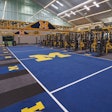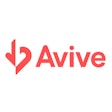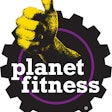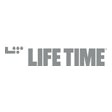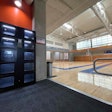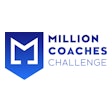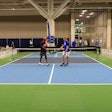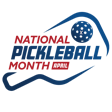Source: The National Athletic Trainers' Association
DALLAS, June 16, 2015 – The National Athletic Trainers’ Association (NATA) will present new and timely research during its 66th Clinical Symposia & AT Expo at the America’s Center, 701 Convention Plaza in St. Louis.
If you’re looking for breaking news on emergency planning; youth sport safety protocols; concussions; exertional heat illness; ulnar collateral injuries; eye nutrition for optimal visual performance; mental health and the athlete; life after knee injuries; hips and muscle intervention; and senior health among a wide range of other health and sports topics, please join NATA for this annual forum.
In addition, NATA will host a national press conference, “Athlete Safety First: From Youth to Professional Play” on Wednesday, June 24 where speakers will unveil new inter-association consensus statement guidelines for spine-injured athletes and unveil other high school sports safety programs (press room number 230).
To view the entire meeting program, visit:
https://convention.nata.org/wp-content/uploads/2015/01/NATA_2015_Prelim_Program.pdf
Also included in the full program are FREE COMMUNICATIONS, these sessions are administered by the NATA Research and Education Foundation and include oral and poster presentations.
WEDNESDAY, JUNE 24:
Psychological Factors that Moderate and Mediate Response to Injury and Recovery for the Athlete with Attention Deficit Hyperactivity Disorder (ADHD)
7:00 a.m.-8:00 a.m.
Room 231
Timothy Neal, MS, ATC, TLN Consulting
Athlete Safety First: From Youth to Professional Play
National Press Event
9:30 a.m.-11:00 a.m.
Room 230
Speakers will present new guidelines on appropriate care of the spine-injured athlete and also unveil a first of its kind national high school grant program to help ensure sports safety.
Tissue Regeneration: Rebuilding the Injured Patient
10:45 a.m.-12:45 p.m.
Ferrara Theater
History and Foundations behind Tissue Regeneration
Current Regenerative Clinical Trials
Lennart Johns, PhD, Quinnipiac University
Implications to Athletic Training Practices
Bradley Montgomery, MAT, ATC, University of Western Alabama
Moderator: Timothy Butterfield, PhD, ATC, University of Kentucky
Doping in Sport and Exercise: Pharmacological and Philosophical Perspectives
10:45 a.m.-12:45 p.m.
Room 221
Beyond the “Roids”: An Update on Ergogenic Pharmaceuticals
Robert Kersey, PhD, ATC California State University, Fullerton
Beyond Good and Evil: Dealing with Doping in the 21st Century
John Gleaves, PhD, California State University, Fullerton
Moderator: James Hand, EdD, ATC, Catawba College
Unique Challenges and Special Considerations in Upper Extremity Rehabilitation for the Aerial and Non-Aerial Circus Arts Performer
1:30 p.m.-2:30 p.m.
Room 274
Speaker: Anthony Piegaro, Jr., MS, ATC, LAT, Cirque du Soleil - Mystere
Moderator: Suzanne Konz, PhD, ATC, CSCS, Marshall University
The Role of Movement Efficiency in Injury Prediction, Prevention and Return to Play Assessment: Lessons Learned from the Military and Beyond
1:30 p.m.-3:30 p.m.
AC Room 225
Movement Efficiency Risk Factors for Lower Extremity Injuries: Results from the JUMP-ACL Cohort and Beyond
Kenneth Cameron, PhD, MPH, ATC, Keller Army Hospital
Can Risk Factors Change Results in Decreased Injury? Effect of a 10-Minute Movement Retraining Program on Subsequent Lower Extremity Injury
Lindsay DiStefano, PhD, ATC, University of Connecticut
Practical Applications for Movement Efficiency Screening to Prevent Injury and Determine Readiness for Return-to-Play
Darin Padua, PhD, ATC, University of North Carolina at Chapel Hill
Moderator: Samuel Johnson, PhD, ATC, CSCS, Oregon State University
Sports Medicine and Disability Sport: Integrating Effective Service Provision
1:30 p.m.-3:30 p.m.
Room 221
More Similar than Different: The Psychological Environment of Paralympic Sport
Traci Statler, PhD, California State University, Fullerton
Role of the AT: Athletes with Physical Adaptations
Dustin Williams, MS, ATC, University of Arizona
Role of the AT: Athletes with Cognitive Adaptations
Jeremy Marra, MS, ATC, CSCS, University of Michigan
Moderator: Peter Toohey, MS, ATC, United States Olympic Committee
Dietary Supplement Use in Young Athletes: Danger Versus Benefit
4:00 p.m.-6:00 p.m.
Room 241
Presented by Sports, Cardiovascular and Wellness Nutrition (SCAN)
Speaker: Tavis Piattoly, MS, RD, LDN, Sports, Cardiovascular and Wellness Nutrition
Speaker: Shelly Mullenix, MS, ATC, Louisiana State University Athletics
Moderator: Andrea Rudser-Rusin ATC, RD, CSSD, Sports Wise Nutrition & Consulting, LLC
Fulfilling the Athletic Training Scope of Practice in the Secondary School Setting: Implementation of Effective Prevention Strategies
4:00 p.m.-6:00 p.m.
Room 225
Functional Pre-Participation Physical Evaluations (FPPE): More Than Just Checking the Box: AT Research Perspective
James Onate, PhD, ATC, FNATA, The Ohio State University
Effective Administrative Strategies for a Secondary School Injury Prevention Program: AT Administrator Perspective
John Reynolds, MS, ATC, VATL, Fairfax County Public Schools
Injury Prevention Strategies from a Boots on the Ground Viewpoint: AT High School Perspective
Danny Ryan, BS, ATC, Whitefield Academy
Moderator: Marc Norcross, PhD, ATC, Oregon State University
THURSDAY, JUNE 25:
Pediatric Ulnar Collateral Injuries: An In-Depth Look at Prevalence, Evidence-Based Recognition, Surgical Intervention and Rehabilitation
7:00 a.m.-9:00 a.m.
Room 225
A Statistical Review of Ulnar Collateral Injury Trends in the Pediatric Population
Gabriel Montoya, ATC, Children’s Hospital of Colorado
An Analysis of the Best Practice for Evaluation and Identification of Ulnar Collateral Ligament Injuries
Matthew Brewer MS, ATC, Children’s Hospital of Colorado
Ulnar Collateral Ligament Injuries: Determining When Surgery is Appropriate, A Description of the Best-Practice Surgical Approach and Proper Rehabilitation
Jay Albright, MD, Children’s Hospital of Colorado
Moderator: Stephen Thomas, PhD, ATC, Neumann University
Using Tablet Devises and Cell Phones for Biomechanical Assessment in an Evidence-Based Athletic Training Practice
7:30 a.m-8:30 a.m.
Room 274
Speaker: David Ruiz, ATC, Orlando Athlete
Moderator: Cordial Gillette, PhD, ATC, University of Wisconsin, LaCrosse
Do Non-Steroidal Anti-Inflammatory Drugs Increase the Risk for Exertional Heat Illness?
7:30 a.m-8:30 a.m.
Room 276
Speaker: Dawn Emerson, MS, ATC, University of South Carolina
Moderator: Brendon McDermott: PhD, ATC, University of Arkansas
Risk Factors for Delayed Symptom Recovery Following Concussion in Adolescents
8:00 a.m.-9:00 a.m.
Room 130
Speaker: Dawn Comstock, PhD, University of Colorado, Denver
Speaker: Janna Fonseca, MEd, ATC, LAT, Carolina Family Practice & Sports Medicine
Moderator: Jason Mihalik, PhD, CATICI, ATC, University of North Carolina at Chapel Hill
Medical Conditions Contributing to Exercise-Related Respiratory Symptoms
9:15 a.m.-10:15 a.m.
Room 276
Speaker: Katherine Newsham, PhD, ATC, Saint Louis University
Moderator: Jay Sedory, MEd, ATC, EMT-T, U.S. Marine Corps
Free Communications: Knowledge and Policy in Emergency Management
9:30 a.m.-10:30 a.m.
Room 132
9:30 a.m.-9:45 a.m.
Knowledge of Athletic Trainers and Emergency Personnel Regarding Management of the Spine Injured Athlete
Elizabeth Neil, MS, ATC, LAT, Indiana State University
9:45 a.m.-10:00 a.m.
Emergency Action Plans in High Schools with and without Athletic Trainers
Samuel Johnson, PhD, ATC, CSCS, Oregon State University
10:00 a.m.-10:15 a.m.
Using the 6+ Spine Board Technique Still Recommended: Evaluating EMS Protocols
MaryBeth Horodyski, EdD, ATC, FNATA, University of Florida
10:15 a.m.-10:30 a.m.
Emergency Care Training Requirements and AED Availability in Oregon High Schools
Eunwook Chang, MEd, ATC, Oregon State University
Moderator: Scott Unruh, EdD, ATC, University of Nebraska, Kearney
J&J Feature Presentation
A Patient-Centered Vision for the Future of the Athletic Training Profession
11:45 a.m.-1:45 p.m.
Hall 5
Importance of Public Perception of Athletic Trainers as Providers of Patient-Centered Care
Gary Wilkerson, EdD, ATC, FNATA, University of Tennessee at Chattanooga
The Athletic Trainers’ Role as a Guardian of Student Athlete Health and Welfare
Brian Hainline, MD, NCAA Chief Medical Officer
Administrative Aspects of the Athletic Trainers’ Responsibilities to Student Athletes
Ron Courson, ATC, PT, NREMT-I, University of Georgia
Moderator: Craig Denegar, PhD, ATC, FNATA, University of Connecticut
Eye Nutrition for Optimal Vision and Performance
5:00 p.m.-6:00 p.m.
Room 274
Speaker: Dawn Weatherwax, RD, CSSD, ATC, Sports Nutrition 2Go
Moderator: Rebecca Lopez, PhD, ATC, CSCS, University of South Florida
FRIDAY, JUNE 26
Sports-Related Concussions in Youth: Changing the Culture
8:45 a.m.-9:45 a.m.
Room 260
Speaker: Tracey Covassin, PhD, ATC, Michigan State University
Moderator: Michael Ferrara, PhD, ATC, FNATA, University of New Hampshire
Free Communications: Heat and Hydration
9:15-10:15 a.m.
Room 125
Rhabdomyolysis in a Female Caucasian Adolescent Distance Runner
Mitchell Todd, ATC, LAT, University of Kentucky
Management of Heat and Exercise-Induced Anaphylaxis in a Collegiate Soccer Player
Gretchen Burskirk, MEd, ATC, University of Toledo
A 17 Year Old High School Football Player Returns to Play After Exertional Heat Stroke
Patrick Tanner, MS, ATC, LAT, IMG Academy
The Effects of Cardiovascular Fitness and Body Composition on Maximal Core Temperature Values in College Football Players during Pre-Season
JoAnna Mclelland, ATC, West Chester University
Gastrointestinal Temperature of Runners Immediately Post an 11.3 km Warm Weather Road Race
Yuri Hosokawa, MAT, ATC, Korey Stringer Institute, University of Connecticut
Thermoregulatory Responses and Hydration Practices in Female, Semi-Professional American Football Players during Football Activities
Rebecca Lopez, PhD, ATC, CSCS, University of South Florida
Collegiate Ice Hockey Athletic Trainers’ Hydration Practices and Knowledge of Fluid Recommendations and Factors Influencing Hydration
Dawn Emerson, MS, ATC, University of South Carolina
The Effect of Sodium Supplementation Using High and Low Sodium Concentration Fluids on Serum Electrolytes, Plasma Volume and Aldosterone in Collegiate Football Players
Sandra Fowkes Godek, PhD. ATC, LAT, West Chester University
Moderator: Rebecca Stearns, PhD, ATC, Korey Stringer Institute
Free Communications: Concussion Practice Patterns and Management
10:30 a.m.-12:00 p.m.
Room 125
Football Coaches’ Knowledge Regarding the Risk Factors, Symptoms and Management of Sport-Related Concussions
Nicole Wasylyk, MSEd, LAT, OTC, Meriter-Unity Point Health Orthopedics
Effect of Viewing a Concussion Education Video Followed by In-Person Reinforcement on Parents’
Concussion Knowledge
Johna Register-Mihalik, PhD, ATC, LAT, University of North Carolina at Chapel Hill
REACT: Testing the Effectiveness of a Poster Education Program on Sport-Related Concussion Knowledge and Attitudes in High School Football Players
Molly Johnson, University of Delaware
Athletic Trainers’ Perceptions of Their Role and Responsibilities Regarding Academic Accommodations as Part of the Concussion Management Process in the Secondary School Setting
Melissa Kay, ATC, A.T. Still University
Athletic Trainers’ Return-to-Learn and Academic Support Recommendations Following Adolescent Concussion
Tricia Kasamatsu, PhD, ATC, University of La Verne
Physician’s Familiarity and Perceptions of Academic Accommodations for Adolescent Athletes Following Sport-Related Concussion
Michelle Weber, MS, ATC, Desert Edge High School
Knowing Isn’t Always Doing: High School Coaches’ Knowledge Regarding Sport-Related Concussions
Meredith Madden, EdD, ATC, Boston University
Current Practices in Collegiate Concussion Management
Christine Baugh, MPH, Boston University School of Medicine
The Impact of Employment Model on Athletic Trainers’ Concussion Management Practices in the Secondary School Setting
Ian McLeod, PA-C, ATC, A.T. Still University
Physician’s Concussion Management and Referral Patterns for Adolescent Athletes Following Sport-Related Concussion
Arika Cozzi, ATC, A.T. Still University
Moderator: Jason Mihalik, PhD, CATICI, ATC, University of North Carolina at Chapel Hill
Mindset of Healing: Psychological Considerations during Rehabilitation
10:45 a.m.-11:45 a.m.
Room 275
Sheri Walters: DPT, MS, ATC, EXOS, Athlete’s Performance
Moderator: Timothy Neal, MS, ATC, TLN Consulting
Life After Knee Injury: The Athletic Trainer’s Role in Preserving Life-Long Joint Health
10:45 a.m.-12:45 p.m.
Room 225
The Inconvenient Truth: A Discussion of the Risk of Post-Traumatic Osteoarthritis Development Following Acute Knee Injury
Jeffrey Driban, PhD, ATC, CSCS, Tufts Medical Center
The Role of the Primary and Secondary Prevention Strategies in Maintaining Joint Health Following ACL Injury
Darin Padua, PhD, ATC, University of North Carolina at Chapel Hill
Incorporating Post-Traumatic Osteoarthritis Prevention into Sports Medicine: the ATC Perspective
Brian Pietrosomine, PhD, ATC, University of North Carolina at Chapel Hill
Moderator: Melissa Montgomery, PhD, ATC, California State University, Northridge
The Senior Athlete: Challenges the Population Present to the Health Care Provider
1:15-2:15 p.m.
Room 275
Speaker: Robert Gray, MS, ATC, Cleveland Sports Health
Moderator: Bernadette Buckley, PhD, ATC, LAT, University of North Florida
Free Communications: Hips Don’t Lie: Muscle Interventions
3:30 p.m.-4:45 p.m.
Room 130
3:30 p.m.-3:45 p.m.
A Comparison of Hip ROM Values Across Sex and Sport
Jennifer Hogg, MA, ATC, University of North Carolina at Greensboro
3:45 p.m.-4:00 p.m.
Comparison of Injury Rates between Trunk and Hip Focused Neuromuscular Training Intervention Group and Speed Training Controls: A Double Blind Randomized Controlled Trial
Kim Barber Foss, MS, ATC, LAT, Cincinnati Children’s Hospital
4:00 p.m.-4:15 p.m.
The Overhead Squat Clinical Movement Assessment Can Identify Athletes with Hip Range of Motion Abnormalities Predictive of Hip Pathology
Barnett Frank, MA, ATC, University of North Carolina at Chapel Hill
4:15 p.m.-4:30 p.m.
Proximal Muscle Compensations in Hip Force Generation in Individuals with Femoroacetabular Impingement
Meghan Maume Miller, MS, ATC, Ohio State University
4:30 p.m. – 4:45 p.m.
The Effects of Gait Retraining on Iliotibial Band Syndrome in Runners
Ariel Guldstrand, ATC, LAT, University of Utah
Moderator: David Bazett-Jones, PhD, ATC, CSCS, Carroll University
About NATA:
National Athletic Trainers’ Association (NATA) – Health Care for Life & Sport
Athletic trainers are health care professionals who specialize in the prevention, diagnosis, treatment and rehabilitation of injuries and sport-related illnesses. They prevent and treat chronic musculoskeletal injuries from sports, physical and occupational activity, and provide immediate care for acute injuries. Athletic trainers offer a continuum of care that is unparalleled in health care. The National Athletic Trainers' Association represents and supports 39,000 members of the athletic training profession. Visit www.nata.org


















